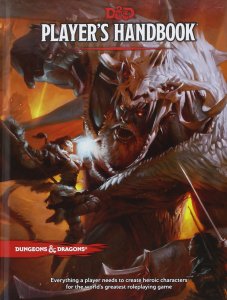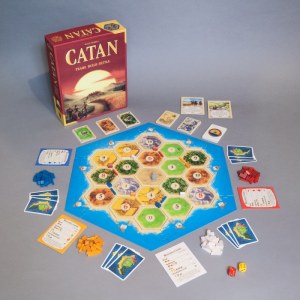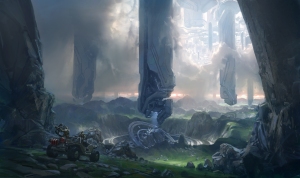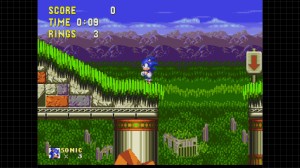I’m back!
Yup, got my replacement ethernet port installed and I’m back in business. I actually did get a pretty good amount of writing done too. Two weeks without internet notwithstanding, as Jungle isn’t in any position at the moment where it requires internet. Okay, well, it required some worldbuilding documents on Google Docs, but those I could skim on my phone.
Jungle, by the way, is still in the finale. Everything’s blowing up, similar to Colony, and that’s not really that much of a surprise as this is a sequel. Hopefully I can be done by the end of this week. There are only a few chapters more to go, and everything’s coming together pretty well. Editing is going to be a chore, but … that’s the writing life!
Okay, enough yammering about current events in my writing queue. Now to yammer about something else. Just a quick reminder, if you’re a Patreon Supporter, check the reward posts! I checked the stats on Patreon yesterday and some of those posts have only ever seen two views despite the number of supporters! I’m not sure if I’m not making them visible enough, or what, but I was genuinely surprised (especially as a few supporters have hinted that they didn’t feel there were enough Patreon rewards for being supporters … and yet a large majority of those rewards have barely been looked at). There’s retrospectives, worldbuilding extras and notes for various books, and even previews and short stories I’ve not posted anywhere else!
If you’re a supporter, don’t miss out! Those posts are for you! You can check out the entire backlog here, or just head on over to my Patreon page if you’re not a supporter yet, but would like to become one.
Okay, that’s all out of the way. Now how about I get down to today’s topic. Which is a bit of an odd one, sure, but one that’s worth bringing up. Today, we’re going to talk about why writers should play games. And no, I’m not talking about the kind of games where you find a maybe significant other and lead them on. Not those games.
No, I’m talking about another type of game. The kind that you play that can involve swords, sorcery, high adventure, or spaceships. The kind that can be played with pen and paper, large complex boards, or even with a controller or keyboard and mouse. Or crud, even the type of game you used to play when you were a kid, running around the playground building a world in your imagination as you played with the other kids.
In other words, I’m talking about the kind of game that people play for fun. For entertainment. And I’ll issue a “warning” right now: Some of you already know exactly what I’m going to say. You’ve already made the connection, and you agree with it. That’s fine; hopefully you enjoy the post all the same. But there are others out there (I know, because I’ve met them) who are looking at this post and thinking to themselves “Playing games? He’s lost it! What does playing games have to do with being a better writer?”
And with that in mind, I’d like to jump right into an explanation by way of analogy: have you ever seen taffy being made?
Taffy is a sweet, chewey candy most of you have likely tried. It’s a popular treat, often appearing seasonally (particularly around the holidays) but usually found in smaller quantities throughout the year. It’s low-cost, tasty, and, well, candy. It’s an all around sweet treat.
Those who have made taffy, or more accurately, attempted to make taffy, however, know that while the treat is certainly simple to unwrap and consume, its creation is another story. It starts out simple enough—gather ingredients, mix in the proper proportions, cook, and then pour out to cool. But then comes a step that is absolutely ruthless … and usually where homemade taffy excursions turn to disaster: pulling.
See, taffy needs to be kneaded, like bread dough. Stretched, folded, and stretched again and again and again in order to get the consistency right. The stretching process aerates the candy, giving it the lighter, fluffy texture and flavor those who’ve consumed it know.
Oh, did I mention that this process was hard? Seriously, taffy is heavy stuff. Nowadays, this is usually done with machines—check this cool video here for a visual—but it can also be done, and once was done, by hand (which you can see here). Which, considering how long the process is, is exhausting. Oh, and taffy is sticky too, so if you don’t oil everything properly, it’s going everywhere.
Right, so cool cool, some of you are mentally checking that box that says “learned something new today,” but I did say that this was going to be an analogy for writing, didn’t I?
Well, I didn’t lie. See, think of the taffy as your brain. Or better yet, the creative aspect that lets you write. When you study what makes good writing, when you learn the ins and outs of a story, take classes, go to writing groups, etc, that can all be likened to the first step of the taffy-making process. You’re gathering the ingredients, putting them together in the pot (your mind!) and then cooking them together. But then, once you’ve done all that … you’re not done. Just as the taffy needs to be aerated and worked in order to blend everything together in the proper portions, your mind needs to be worked, exercised, and aerated with external elements in order to become something other than a dense mixture of writing ins and outs.
And games? Well, they’re one of those things that really work that creative mind. That stretch and pull it—just as the taffy is—to give it a workout.
For example, let’s talk about pen and paper roleplaying games, such as Dungeons and Dragons. One of the more obvious contenders for writers, to the degree that many, particularly of Sci-Fi and Fantasy, are players and can be found at cons playing short games or swapping stories about various adventures.
The thing is, there’s a reason beyond simply having fun that these authors play these games—though make no mistake, the fun is first and foremost. See, the way pen and paper games work are designed to make the players and the host stretch their mental muscles, and—

Actually, hang on. I just realized that there may be some here who have no idea how these games work (or only “know” from “news” reports or worse, Big Bang Theory), so maybe I should give a quick rundown. In a pen and paper or tabletop roleplaying games such as Dungeons and Dragons, one player takes the role of the DM/GM, or Dungeon Master/Game Master. Their role is similar to the director of a film or author of a book. They fill in the roll of the world that the game takes place in, acting as characters, antagonists, bringing the world to life for the other players, and putting obstacles in front of the players (though a lot of times, players will do that on their own).
Meanwhile, the rest of the players create characters that they will play as that inhabit the universe, and then work together (usually, but not always) to have an adventure. The dice come into it by essentially acting as probability values for how likely your character is to succeed at something.
That’s the gist of it. Everything else is gravy. Hopefully you can already see how this can be fun, but if not, think of it this way: The game is at the mercy of the players imaginations, and that’s where half of the fun comes from. While the players can be stereotypical warriors of light, fighting evil with sword and sorcery, they don’t have to be. In fact, they can be whatever they can reasonably get away with. For example, I heard of one game that began as the typical sword and sorcery example, with the players all new adventurers out to prove their worth against the eventual threat of a rising villain with dark plans for the world … except they were quickly sidetracked by an early quest involving cows.
Yes, cows. And other livestock. I don’t recall all the details, but the players saw an opportunity to make some serious cash in one of the first kingdoms they entered, which was importing its meat or some such at high cost. Initially, if I recall correctly, they acquired some cattle in order to make a later payout for arms and gear … only once they’d made their cash off of their cattle they all looked at one another and one of the players said “Hey, what if we reinvest this?”
The result? The GM went and did a bunch of research on period-accurate livestock ranches so that they could keep everything straight, and the players turned their character’s skills towards running a cattle ranch. Then two ranches. Then three, and hiring and training ranch hands.
A year later, when the big bad finally reared his head on their continent? They were warriors of the pocket-book: Cattle barons! Rather than picking up their swords to dispatch the villain themselves, as the campaign had started with the intention of, they were wealthy enough to hire some of the toughest and baddest heroes in the land and send them after the bad guy, with a nice bounty on the villain’s head being the cherry on top.
Boom. Victory. Big bad stopped. And still at the hands of the players … except that they simply footed the bill and continued herding cattle.
That’s pen and paper play. Would-be adventurers become cattle barons and hire bounty-hunters to off the big bad. Another game I heard of took out a villain in a similar way—one of the players had been investing their reward money into shipping, and so could raise a merchant fleet to bring the antagonists “pirate navy” to a stop before it ever really got started (it didn’t help that he owned half the ships the antagonist had “recruited”). Sure, you can do the standard adventure too … and there’s still all that freedom to find clever solutions there as well.
So, are you seeing how a game like this can be good for the mental muscles of the player … or in our case, an author? Tabletop games are games that reward creative thinking … and even in a bog-standard adventure, you’ll find plenty of openings for utilizing such. They give the player a chance to connect different dots, work with other characters, problem solve, and just in general fuel their creative instinct, stretching it and working it.
And even if you don’t tap into that resource to its fullest, you’ll still get a chance to stretch your mind as you wander around various worlds of Fantasy or Science-Fiction. You’ll come across strange places and things, and be forced to puzzle on them or contemplate them. And each time you do, your mind will stretch a little bit more. Each time you push yourself to come up with clever solution, or a way to sweet-talk someone, or try and figure out a puzzle, you’ll be working your own mental muscles, which in turn means that they’ll be that much more flexible and prepared when you’re writing your own puzzles, traps, and solutions.
See, in each and every tabletop game that’s played, the players build a story. A narrative. One with winding twists and turns, or straight shots from battle to battle. But it’s a story, and a story you’ll participate in. And as you participate, you’ll see trends, spot things that did or didn’t work for you as a participant, things you can later adjust for your writing to make your story a bit better for others.
Oh, and you’ll probably have a good amount of fun, too. Pen and paper games can be quite the blast with the right group of players.
But what about other types of games? Because this post ain’t titled “Why Writers Should Play Pen and Paper Games.” It’s just “Games,” a much broader net.
For example, what about board games? Should authors be playing those?

Absolutely. Why? Because those games are explorations of systems, from political to economical. Sure, they’re slimmed down oft-times for simplicity’s sake and to help things be approachable, but while that means you can’t take them as one-for-one explanations of a particular system, they can give you insight into the bare bones of how such a system can function in a light but hands-on manner.
Don’t think this is valuable in your writing yet? Well hang on, because there’s still the other half of the coin. Which is that you get a chance not only to see these systems, but also to play in that sandbox with other people and learn how to maneuver inside those systems. And that is something worth learning and knowing!
See, writing is all about understanding systems, from social (romance, diplomatic, or politcal, among many others) to mechanical (magic, machinery, science, etc, etc) and then using those systems in your work to clever effect. Any story you write, no matter what the setting, is going to be reliant on some sort of system. It can be a political system, a power grid … crud, even a religious hierarchy. But there will be systems of some kind. And understanding those systems is going to be key to your ability not just to present them, but then have the various characters and elements of your story work within or around them.
And that’s what board games are all about: Understanding and using various systems and rules to your advantage with or against the other players. Or figuring out how to step outside them entirely (some games use this to great advantage, in fact) to achieve something normally impossible.
Card games, such as Magic: The Gathering or World of Warcraft (yes, there was a WoW card game, and it was awesome) offer similar experiences. In each case there is a clearly defined system that everything operates under, the difference being that with card games tend often revolve around players building decks that specifically go around the system in order to win, or make use of obscure back ends to achieve victory.
Both of these games, board and card, are great fun to play, but playing them will also stretch your mind out to start seeing the systems all around you, and hopefully in your own books. Your characters won’t have a literal hand of cards, but they will have a selection of options available to them, each with different repercussions and aftereffects inside the system you’ve built. Playing board and card games can be a boon to keeping your mind sharp in this respect.
Ah, but what about other types of games? Like say, video games? Should you be playing those as well? If you enjoy them (or if you haven’t tried them), then … yes. You should.
Now I can see some of you scratching your heads perhaps with this one. Unlike board games, a video games’ systems are generally less forward. And due to the nature of how most games work, you can’t just do anything you set your mind to. No, you are limited, however much it may seem to the contrary, to what the game’s creators could create.
But that doesn’t mean video games aren’t worth your time. See, games do something really well that other games can’t quite pull off with the same aplomb, rivaled only in part by pen and paper games: They give you a world.

Video games are chock-full of details and settings that not only bring the world to life, even in the old days of limited color palettes and tech, but then let the player explore it and tease them about further depth. And whether or not they explore it—after all, the player never gets to wander through one of those giant towers in the Halo 4 art there, it starts the mind thinking about them and hunting for the possibility of what they were doing with each burst of energy.
The point is that if you play these games, you can simply try to run through them … or you can look at the worlds on display and start thinking about them. And yes, games can tell stories too (sometimes gripping ones, or sad ones), complete with elements you can learn there for your writing like any other story … but they give you these worlds to think about. Inspiration, in other words.
For example, when playing the first Gears of War game, its very clear that Raam, the antagonist of the title, took inspiration from the leader of Sauroman’s White Hand Uruk-hai, and that the ruined devastation of the COG cities from the ruins of Osgiliath (both from the Lord of the Rings films). In turn, playing those games has personally inspired a lot of thought on the nature of the ruins and the presentation of the antagonists both, and has in turn prompted and given way to me exercising my own creative “ruins” and presentation of protagonists in my writing.

See, I don’t see video games as a “fenced” box of creativity. They’re often impressive displays of originality, originality which in turn can be a creative springboard for your own mind to leap off of. You can see something really neat or creative, and in turn that can be a bit of fuel for your own mind to start playing with similar concepts that can turn into new ideas.
Not a gamer? That’s fine. You can find inspiration elsewhere! Personally, I’ve found that games are a great way to get the mind running on ideas and concepts. The tantalizing worlds they present are great for offering hints of what could be that in turn can grow in the mind to be something entirely new.
Okay. One more to go: “Children’s” games. I’m putting that in quotes because it’s entirely possible to play many of them as an adult, such as tag, hide-and-seek, and all the rest. What do these have to do with writing, though?
Have you ever watched a group of kids play tag? Seen one kid declare themselves their favorite hero, and all the other kids quickly jump in with who they’re playing as? Or watched as a narrative develops during the game, with allies and enemies?
This is storytelling in a pure but simplistic form. Now I’m not saying you need to go out and play tag … but the adult versions of this make-believe are still there, from games of paintball to softball to even professional sports. There are narratives that are built there, in the minds of the players and the fans. And that’s a form of storytelling!
Now, that particular venue isn’t mine, so that’s all I can say on it. But there is storytelling there. Especially as you move back towards the roots with the games children play. Imagination is a key element of those games … and in writing good fiction.
Brain feeling like taffy yet? I hope so. To bring it all back together, games are good for us. Especially as writers, games can be a source of knowledge and inspiration on multiple levels. They let us examine systems, characters, emotions, narratives, and then play in them, all while fueling our mind to take those same elements and play with them in our writing later. Pen and paper games inspire creativity and character interaction, board games teach us the ins and outs of systems and how to abuse them, and video games present worlds that can invite us to ponder and make creative leaps to our own settings and locations. Children’s games play with basic narrative and (often-oddball) leaps of fancy.
Simply put, you’re never to old for games. They keep the mind working, keep it fresh and sharp. They’re exercises for the mind, to keep it healthy and focused.
So get out there, and go play something. Have fun. Stretch your mind.
Good luck. Now get playing. Then go write something.
Enjoy this post? Support the author via Patreon!
Interesting to be honest I’ve never heard of a brain being described that way but great blog either way.
LikeLike
Ever heard of a game called Mass Effect? It has quite a lot of story telling and well-thought out characters in it, as well as being an RPG (best games are RPGs :)). Skyrim and other elderscrolls games are pretty much do whatever you want to games in a hugely open world as well.
LikeLike
Oh yeah, played Mass Effect. Lots of worldbuilding in that series (slow elevators, though).
LikeLike
[…] touched on this before. Indirectly. Being a Better Writer has seen a number of posts on things like Why Writers Should Play Games or Writing Exercises for Viewpoints. Among others (hit the tags on those links to find more). A […]
LikeLike
[…] But there’s another reason that experimentation is good that I wish to talk about, before we move into the latter half of this post. And this goes back to a post I wrote some time back that referenced the process of making taffy. […]
LikeLike
[…] just going about looking for their muse the wrong way. They’re confusing the process of exposure and mental activity with work. If your first thought to “summon the muse” is “have fun until you feel […]
LikeLike